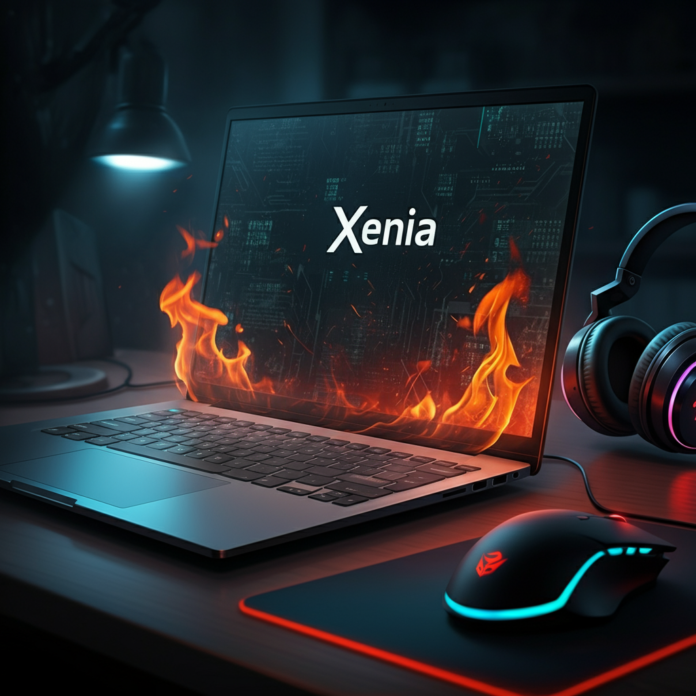Laptop overheating is one of the most frustrating issues for users across various categories, from casual browsers to gamers and tech enthusiasts. If you’ve experienced sudden shutdowns and are scratching your head, wondering, “Is Xenia causing my laptop to overheat and shut down?”—you’re not alone.
Xenia, a popular emulator praised for enabling users to run high-performance gaming software on Windows devices, is often linked to overheating concerns. But why does this happen, and what can you do about it? This guide dives deep into the issue, providing practical insights and solutions to help you tackle the problem.
Understanding Xenia and Its Role in Overheating
What is Xenia?
Xenia is a cutting-edge Xbox 360 emulator that allows PC users to enjoy console-exclusive gaming titles on their machines. While its functionality and ability to unlock gaming nostalgia have made it incredibly popular, running resource-intensive software like Xenia can be taxing on your laptop’s hardware.
The Overheating Problem
Xenia heavily utilizes both your central processing unit (CPU) and graphics processing unit (GPU) to simulate an Xbox 360 environment. This results in increased heat generation, as components work overtime to maintain performance.
“Xenia, like many resource-intensive applications, can strain a laptop’s cooling system. It’s crucial for users to understand this impact and take proactive measures to prevent overheating,” explains Alex Smith, a technology analyst.
When your laptop’s internal temperature rises beyond safe levels, it may trigger automatic shutdowns to prevent damage. If this happens repeatedly, it can lead to long-term performance degradation and even shorten your laptop’s lifespan.
The Impact of Xenia Overheating
The effects of Xenia-related overheating vary depending on the type of user you are.
Casual Laptop Users
For casual users who use Xenia occasionally, the overheating issue may seem like a one-off inconvenience. However, even intermittent overheating has the potential to weaken your laptop’s internal components over time.
Professional Users
If you rely on your laptop for work and leisure, you’re juggling performance and reliability. Overheating not only disrupts your gaming experience but may also affect your productivity, especially when shutdowns occur unexpectedly.
Hardcore Gamers
Gamers are often the hardest hit. “Gaming laptops, in particular, face higher risks of overheating when running demanding games through software like Xenia. Investing in additional cooling solutions can be a game-changer,” suggests Michael Lee, a tech enthusiast and PC gamer.
How to Prevent Xenia-Related Laptop Overheating
Thankfully, there are several preventive measures and solutions to minimize laptop overheating caused by Xenia.
1. Keep Your Laptop Clean
Dust accumulation inside your laptop can block fans and heat sinks, reducing their cooling efficiency. Clean your device regularly by using compressed air to remove dust build-ups.
2. Monitor Laptop Temperatures
Use hardware monitoring tools like HWMonitor, MSI Afterburner, or Core Temp to track your laptop’s internal temperatures. Maintaining your laptop below 85°C is crucial to avoid thermal issues.
3. Optimize Your Settings in Xenia
Lower the resolution and graphics settings in Xenia. This helps reduce the load on your CPU/GPU, which in turn lowers heat production.
4. Invest in Cooling Accessories
Laptop cooling pads and external fans can provide an additional stream of cool air to prevent your device from overheating during heavy use. These cost-effective solutions are highly recommended for regular or hardcore users.
5. Regularly Update Your Software and Drivers
Ensure Xenia is updated to its latest version, as updates may optimize performance to reduce system load. Similarly, keep your GPU drivers up to date for better compatibility.
6. Apply Thermal Paste
If you’re confident with hardware fixes, replace the thermal paste on your laptop’s CPU/GPU. Over time, the paste can dry out, reducing its ability to transfer heat from the processor to the heat sink.
“Regular maintenance and monitoring are essential to mitigate the risks of overheating,” advises Claire Johnson, a computer engineer specializing in hardware.
Alternatives and Long-Term Cooling Solutions
If Xenia is critical to your laptop usage but is consistently causing overheating, you might want to consider these tips for a more balanced approach.
Alternative Emulator Options
While Xenia is one of the most popular Xbox emulators, consider less resource-intensive alternatives, depending on your needs. However, be cautious—ensure these alternatives are trustworthy and user-verified.
Upgrade Your Laptop
If you’re facing repeated shutdowns despite preventative measures, it may be time to invest in a more powerful laptop. Modern gaming laptops are equipped with advanced cooling solutions that can handle demanding workloads.
External GPU (eGPU) Option
An external GPU can offload tasks that would otherwise be performed by your laptop’s internal GPU. This reduces strain on your laptop’s components and minimizes the risk of overheating.
Real-Life Experiences with Xenia and Overheating
Case Study 1—The Everyday User
Jane, a college student, used Xenia on her mid-range laptop to play her favorite childhood Xbox game. Within an hour, her laptop overheated and shut down, forcing her to pause her gaming sessions frequently. After using a cooling pad and lowering Xenia’s graphics settings, Jane reported a noticeable improvement.
Case Study 2—The Hardcore Gamer
Carlos, a dedicated gamer, found Xenia indispensable for playing older Xbox titles. However, he experienced consistent overheating during extended gaming sessions. Carlos upgraded his thermal paste and implemented external cooling solutions, enabling him to enjoy uninterrupted gameplay.
Case Study 3—The Professional
Sarah works in IT and uses Xenia for testing purposes. Experiencing overheating issues, she optimized Xenia’s configuration and set up an external fan. Sarah now uses Xenia without interruptions, maintaining her focus and productivity.
Share Your Overheating Solutions
If Xenia is causing your laptop to overheat and shut down, these preventive and cooling strategies can make all the difference. Implementing them not only protects your device but also ensures a smooth and enjoyable gaming or emulating experience.
Have you experienced overheating with Xenia? Share your story or your best tips in the comments below. Together, we can help fellow users overcome this common challenge!


